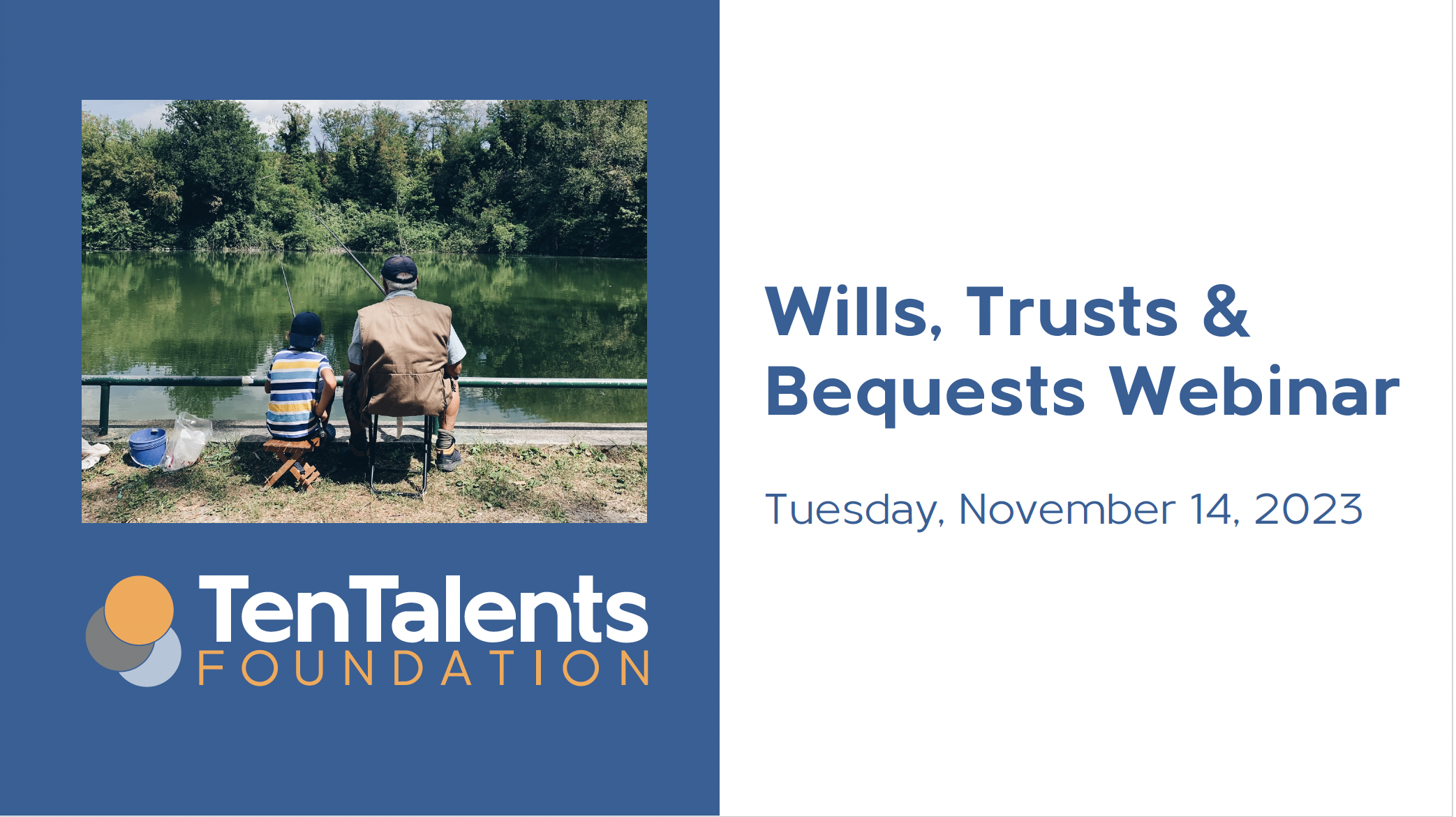Estate Planning
wills, trusts & bequests
Whether you have an established trust and want to include a bequest in your plan, or you don’t know where to begin, this page is for you! Learn how to protect your family and assets, have peace of mind, and leave a lasting legacy through these helpful resources. ↓


Don’t know where to start?
Watch this Webinar Recording

On November 14th, the Ten Talents Foundation hosted a webinar for anyone who wants to learn how to protect their assets and loved ones through a will or trust and how to leave assets to a nonprofit through bequests!
You will learn from Alice M. Dostálová-Busick, Trusts & Estates Attorney with Fennemore Law.
Connect With an Attorney

Putting off your estate planning? You’re not alone. 50% of people who don’t have a will or trust say that procrastination is a main reason (Caring.com).
If you need help finding an attorney to begin your estate plan, contact Ten Talents and we can connect you with trusted professionals to help you begin planning or adding to your current plan.
Wills & Trusts FAQs
Who should have a will or trust in place?
You are never too young to have a will or trust. Estate planning is especially essentially for anyone who is married, has children, and/or owns property of any kind.
Why should I have a will or trust?
Control and Clarity: A will or trust allows you to decide how your assets will be distributed and ensures your wishes are clearly communicated, preventing potential disputes and confusion among your family.
Protection for Loved Ones: With a will or trust, you can provide for your loved ones, ensuring their financial security and proper care.
Avoiding Probate: Having a will or trust in place can help your beneficiaries avoid the costly, often lengthy process of probate (the process by which an individual’s assets are validated by the courts and distributed), giving you peace of mind and securing your legacy for future generations.
Note: If you are a resident of California, your attorney has or will likely advise you to set up a Revocable Living Trust (RLT) in place of a traditional will. The RLT is designed to help families avoid probate amidst California’s complex estate laws.
What if I don’t have a will or trust?
The Ten Talents Foundation, a local Christian foundation, can connect you to a trusted estate planning attorney who can walk through this process with you. Attorneys provide wisdom and insight to help you plan for the future and create a bequest that fits well with your estate situation. Contact Ten Talents Foundation at (559) 387-5534 or info@tentalentsfoundation.org to learn more.
If you have a simplistic (non-complex) estate, a more affordable alternative to an estate planning attorney may be FreeWill, a national organization that hosts a free online will-making platform. If this sounds like it may be a good fit for you, you can find out more at www.freewill.com.
Charitable Bequests FAQs
A charitable bequest is a gift (of money or assets) left to a charity in a will or trust. Charitable bequests are a common and meaningful way for individuals and families to support the causes they love beyond their own lives.
What are the benefits of charitable bequests?
They make an impact far into the future. Bequests provide the opportunity for supporters of churches and faith-based ministries to continue investing in God’s kingdom work on earth even after they are no longer living.
They bring sustainability and security to ministries. Bequests help secure the future of ministries by allowing them to plan ahead and budget for years to come.
They can be powerful tools for reducing estate taxes. Estates worth over a certain amount are subject to federal tax. Charitable bequests can serve as deductions from the value of the estate.
They are an investment in a family legacy of generosity. Bequests to charities serve as a proclamation of a family’s priorities and are an opportunity to encourage a generational legacy of giving.
What type of gifts can be left as charitable bequests?
Charitable bequests can be gifts of cash or assets. Assets that can be gifted as bequests include homes, land, commercial property, stocks, and more.
Who can receive charitable bequests?
If you already have a will or trust in place, you can talk to your attorney today about adding a bequest to your existing will or trust. Bequests are relatively easy to set up, and can be revoked at any time if you change your mind. If you have a tax advisor and/or financial planner, you may want to also consult with them before making the decision.
How can I make a charitable bequest?
Proceeds can be allocated to a grower’s existing Giving Fund (Donor Advised Fund) at Ten Talents, or used to establish a new fund, which distributes to charitable organizations over time as advised by the grower.
“If you have a passion for an organization in your life, [you can include them in your legacy, no matter the size of the gift].”
~ Don Eskes, Fresno Mission Director of Strategic Initiatives